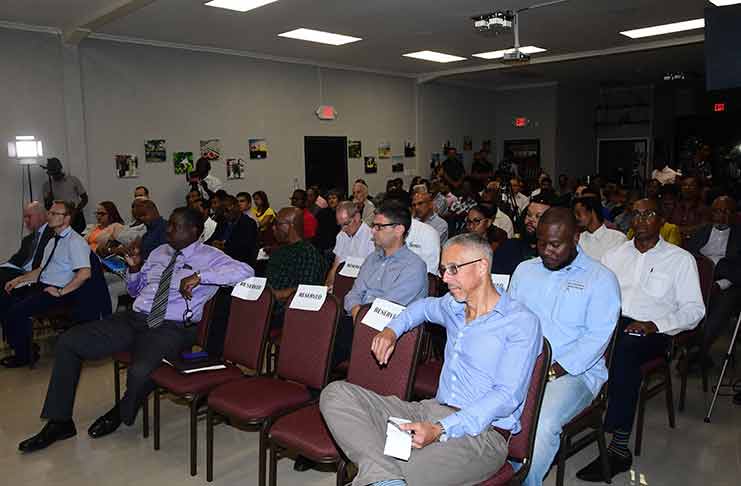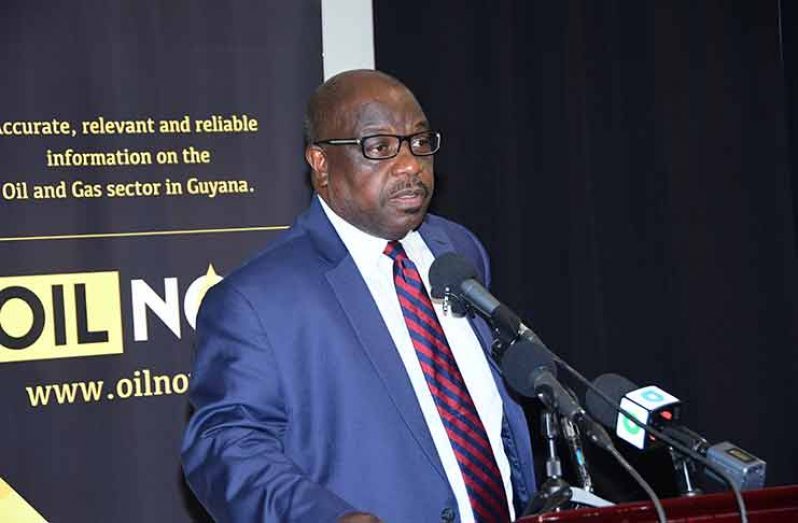…economist tells forum
GUYANA’S Local Content Policy should allow for the building of competencies and capabilities in a wide cross-section of areas that are necessary to advance the country’s Green State Development Strategy (GSDS), Dean of the University of Guyana (UG) School of Entrepreneurship and Business Innovation (SEBI), Dr. Leyland Lucas, said on Wednesday.
Dr. Lucas, who was among 10 speakers who addressed a private sector forum on Guyana’s draft Local Content Policy at a symposium, said while it is critical for the country to be well positioned to tap into the vast opportunities that the Oil and Gas Industry brings, it is must not limit itself to that industry.
“Where do we go as a nation when oil prices are low and producers have decided that it is not within their best interest to continue pumping oil at a certain level? The nation has to survive; the development has to continue, and that development has to be built around the Green State Development Strategy,” Dr. Lucas told the well-attended forum organised by the Georgetown Chamber of Commerce and Industry (GCCI).

The draft Local Content Policy, when adopted by the National Assembly, would outline the framework on which local content will be understood, developed, measured and secured and it is Dr. Lucas’ belief that it should be geared towards realising the objectives of the Green State Development Strategy (GSDS) Vision 2040 – a plan that will guide the management of the country’s natural resource wealth, support economic resilience, and build human capital and institutional capacity.
“So when I think about this concept of local content, I think everything we need to do, must be around building competencies and capabilities that are necessary to advance our national development strategy and not so much as to fit into the needs of the Oil and Gas Sector,” the University of Guyana Dean reasoned.
While using the opportunity to applaud the Government of Guyana for developing the Local Content Policy, Dr. Lucas said because of the country’s failure to put critical systems in place in the past, it is important, at this stage, to manage local content.

“Local content has to be managed, in part, because as a nation over 30 plus years we failed to develop a human capital development strategy,” he said, while adding that as a result of that failure, Guyanese would not be able to immediately take full advantage of the massive opportunities that are coming as a result of the emergence of this sector. Those benefits of local content, he posited, will be experienced in Guyana ‘years down the road.’
“More importantly, as we think about local content, we also have to bear in mind that over the past 30 plus years, we have been exporting our most important resource, human capital, and because we have been exporting human capital, now to take advantage of local content, the definition of local content cannot ignore the diaspora,” Dr. Lucas said during what turned out to be a very frank but respectful discourse.
He posited that the expansion of the definition should not only address issues of building human capacity but, also development of partnerships and joint ventures.
But while former Minister of Natural Resources and the Environment, Robert Persaud, endorsed the concept of building local content around a national development strategy, he opined that ‘plan’ should not be the Green State Development Strategy.
“I see local content as bridging the expectations gap between what is taking place in the industry and what it means to the ordinary man and woman, don’t matter where he or she lives…but the Local Content Policy has to be linked…it has to be mainstreamed in a national development strategy, not an environmental strategy which is the Green State Development Strategy, but a national development strategy that looks where the country is going to be in 2030, in 2040,” Persaud opined. According to him, that strategy must garner the support of all stakeholders.
Meanwhile, President of American Chamber of Commerce of Guyana (AMCHAM), Zulfikar Ally, said AMCHAM has taken note of the fact that the defining parameters for Guyanese local content policy framework is well aligned with globally-accepted standards for local content plans in the oil and gas sector.
He pointed out that it provides for workforce development, such as training and employment of local workforce; supplier development through the increasing localised supply chains in procuring goods and services; and through additional factors, such as capacity building and knowledge transfer.

Photos by Adrian Narine
“Key to local content development is early understanding of opportunities, challenges and or barriers to enable Guyanese workforce and business participation. This analysis when conducted and performed collaboratively with industry can support developing capacity with realistic targets while avoiding unintended consequences. I believe that the proposed local plan and its requirements for the developers, contractors and suppliers to report half yearly on implementation timelines are welcomed,” the AMCHAM President said.
He noted that the American Chamber of Commerce of Guyana is also pleased that there local content plan would allow for gradual implementation by companies based on the various stages of their development. This, he said, is important because there are different stages of exploration, development and production that entail various degrees of expertise and commodities.
“Underpinning the approaches and analysis emanating from the draft policy, I believes it is also critical to ensure transparent and free flowing information, within the bounds of commercial sensitivities — balancing local development and a stable and enabling business environment. As national authorities work collaboratively with industry, partners, advisers and other development stakeholders including civil society, it is necessary that a steady supply of information is provided so opportunities and requirements are understood by companies operating in the sector and that the existing capability of local firms is clear in the market place,” Ally added.
Executive Director of the Environmental Protection Agency (EPA), Dr. Vincent Adams; immediate past President of GGCI, Deodat Indar; President of GCCI; Nicholas Boyer and Charles Ramson Jnr. were among the presenters.




.png)









